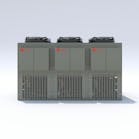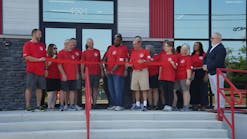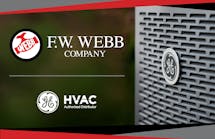Have you ever needed a new set of golf clubs and found that the local sporting goods supply chain didn't have exactly what you wanted? Or, that they have what you "think" you want, but there isn't an expert golf pro on hand at the store to explain which clubs are a perfect fit for you and why? A better option would be to go to a golf specialty shop. Sure, it's going to be more expensive, but there's a really good chance that you're going to walk out of that store with clubs that are sized correctly for your height, and a golf expert would have helped you decide which clubs to purchase. A plan and spec business is comparable to a golf specialty store. Industry experts in the plan and spec business are trained and certified to find the correct equipment needed and specified for each job.
Bud Mingledorff, chairman of the board at Mingledorff's Inc., Norcross, GA, says, "The plan and spec market basically stands for plans and specifications. It tends to work with larger, more sophisticated jobs that are designed by professional engineers."
The plan and spec industry is part of the commercial new construction business. Mingledorff explains, "The commercial new construction business is divided into two pieces, one is the design build market, and the other is plan and spec. Design build jobs are normally designed by the contractor at the contractor level, not by engineers. A Sunday school addition would be a design build job as a rule, unless it's a really big church. Design build jobs tend to be smaller, and plan and spec jobs tend to be larger and more complicated. A school job is a good example of a plan and spec job. The classrooms have to meet fresh air requirements and government regulations. The school has fire dampers and fire suppression control systems that need to be installed. You're just dealing with a more sophisticated level."
Plan and spec businesses deal with specific products that can be specified for each job. Bill Shaw, CEO of Standard Supply and Distributing Co. Inc., Dallas, TX, and owner and CEO of Bartos Industries, a plan and spec business, tells HVACR Distribution Business: "You have wholesalers, and you have plan and spec reps. The big difference is a plan and spec rep usually has a defined territory, and it represents the manufacturer exclusively for that territory."
Shaw has a wholesale company and a plan and spec business. Standard Supply is his wholesale company and Bartos is the plan and spec business.
Some products are not suitable for plan and spec. Shaw explains: "A basic flex duct has no specifiable features and it has a broad distribution to many people. It doesn't pay off for me to get it specified or put it on some drawings. There are 10 other supply companies that sell the same product. But at Bartos, we're the rep for Greenheck fans for the north Texas area. If you want a Greenheck fan, you can only get it through Bartos. Therefore, we can afford to put the time and energy into working with engineers and architects and getting the product specified."
In order to get the products specified, Shaw employs a large team of experts. "We have every department that you would want for a plan and spec company." Shaw offers a breakdown of the Bartos departments:
-
Engineering Department — engineers who call on engineers.
-
Sales Department — sales engineers who call on contractors.
-
Inside Sales Department — engineers-in-training who answer the phone and take incoming product questions.
-
Take-off Department — engineers-in-training who take the smaller items like grills and fixtures off the prints and work on that before handing the big-ticket items off to the engineering department.
-
Aftermarket Sales Department — calls on existing buildings, like hospitals and schools, that can use specified products.
-
Architect Department — mainly deals with sound and noise control.
-
Warehousing Department — stock product.
"We house more than the average plan and spec company," Shaw says. "Since I own wholesalers too, I see a benefit in having some stock."
Mingledorff also works on the wholesale business and plan and spec. "I work on both sides of the street. I'm a light commercial distributor and handle equipment all the way down to small equipment, but I handle very large jobs as well," he says.
"We bought air distribution, manufacturer's rep agencies, and these companies specialize in the plan and spec jobs. We're selling everything associated with the distribution of air from ventilation fans to kitchen hoods, to ducts and registers."
Mingledorff's also is a Carrier air-conditioning distributor. "We are one of the few that have a charter from the Carrier company to sell all of their products, including the chillers," he says. Mingledorff's strategy is to sell everything that's needed in a building, from the largest air-conditioning equipment down to the smallest dehumidification unit that might be in a paper storage room. "Our sales strategy is to be one of the few people that you can call that will literally price everything on the job."
Some jobs can get enormous, so there is a downside to being in this situation. Mingledorff explains: "The more you bundle together, the more likely it is that you can make someone angry. What happens with companies that bundle everything together is, if you make the customer mad on the Carrier equipment side, they won't buy from you on the air distribution side."
The way Mingledorff tries to combat that is by keeping a different sales force for the air distribution side of the business and the air-conditioning side of the business.
"The contractor looks at both of these components as two distinctly different businesses, and he wants to do business with experts on both sides of the business," says Mingledorff. "He doesn't consider the Carrier salesperson to be an expert on Greenheck equipment, nor does he consider the Greenheck salesperson to be an expert on Carrier equipment. We try to encompass the whole thing. It's a very complicated strategy. It's a challenge."
The upside from a convenience standpoint is that the contractor can do business with one company, source everything for the job at one time, and only deal with one or two salespeople for the entire job. Just as the specialty golf store gives customers more attention to detail for their money, the plan and spec business gives contractors the specifications needed to make sure the job is right the first time through. Doug Kissler, president of Johnson Air Products, Portland, OR, who also is involved in the plan and spec business, tells HVACR Distribution Business: "It's all about convincing our customers that if they pay a little bit more for something, it's always going to be right. There's not going to be a hassle, and it makes a big difference when the job is done."
Kate Kelly is an associate editor with Contracting Business magazine. Contact her at 216/931-9755 or [email protected].








